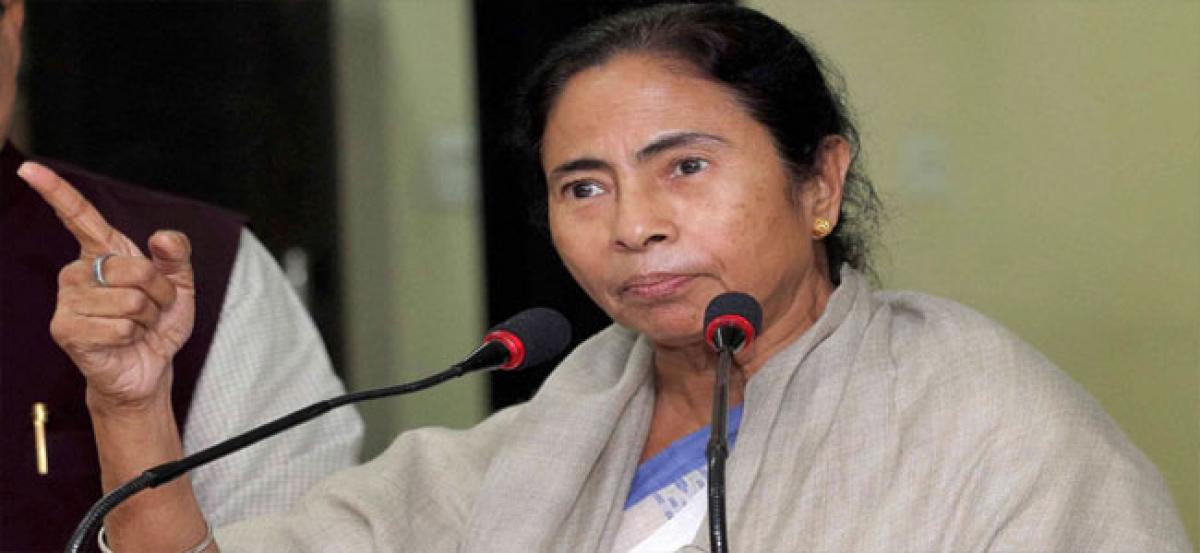Live
- National Energy Conservation Day: Switch to Energy-Efficient Devices
- Rekha gets emotional as she shares a heartfelt moment with Big B's grandson Agastya Nanda
- Senior Cong leader EVKS Elangovan passes away in Chennai
- CID's Counter Intelligence raids multiple places in J&K’s Anantnag, Kulgam districts
- India's growth on resilient trajectory, equity markets in consolidation phase
- KJo on 23 years of ‘Kabhi Khushi Kabhie Gham’: One of those pinch me moments
- WPL 2025 auction: Nandini, Kamalini set to be most sought-after names
- MP CM to inaugurate Sarsi resort in Shahdol, 200-bed hospital in Mauganj today
- TGPSC makes arrangements for Group-2 exams to be held tomorrow
- WPL 2025 Auction: When and where to watch, date, time, live streaming, venue
Just In

Questioning the West Bengal government\'s curbs on Durga idol immersion, the Calcutta High Court on Wednesday said the State cannot hinder a citizen\'s right to practise religion on the basis of a mere assumption of law and order disruption and must provide sound reasons for doing so.
KOLKATA: Questioning the West Bengal government's curbs on Durga idol immersion, the Calcutta High Court on Wednesday said the State cannot hinder a citizen's right to practise religion on the basis of a mere assumption of law and order disruption and must provide sound reasons for doing so.
"Let them (Hindus and Muslims) live in harmony, do not create a line between them," acting Chief Justice Rakesh Tiwary said, asking the government to provide a "concrete ground" for its decision to stop the immersion of Durga idols after 10pm on September 30 (Vijaya Dashami day) and on October 1 on account of Muharram.
HIGHLIGHTS
- Let them (Hindus and Muslims) live in harmony, do not create a line between them: Acting Chief Justice Rakesh Tiwary said
- Bengal govt has imposed restrictions on Durga idol immersions on Sept 30, the Vijaya Dashami day, after 10pm and no immersion would be allowed on Oct 1, on the day of Muharram
Hearing three PILs challenging the restrictions on immersion of idols at the end of the five-day Durga Puja festival, a bench, also comprising Justice Harish Tandon, said a mere assumption that a law-and-order situation might arise, owing to Vijaya Dashami and Muharram falling one after the other, could not be the basis of imposing curbs on immersion timings.
Observing that Chief Minister Mamata Banerjee had herself told a public meeting that Hindus and Muslims lived together in harmony in the state, the bench said, "Listen to what the head of the state says and not a police officer."
"People have the right to practise their religious activities, whichever community they may be of, and the State cannot put restrictions, unless it has a concrete ground to believe that two communities cannot live together," the acting chief justice said.
"You must clarify why are you apprehending a law-and-order situation," the bench told state Advocate General (AG) Kishore Dutta, who claimed that it was the administration's prerogative to decide on steps to prevent any untoward situation.
"Public order and law-and-order are administrative issues," Dutta submitted, while claiming that the court's interference in it would amount to trudging into the administration's domain.
The West Bengal government has imposed restrictions on Durga idol immersions on September 30, the Vijaya Dashami day, after 10pm and no immersion would be allowed on October 1, the day Muharram is scheduled to be observed.
The bench said the administration could regulate the routes for the immersion processions to follow and those through which the 'Tajia' processions of Muharram would pass.
"In the interest of maintaining law-and-order and in order to prevent an untoward incident, the administration can regulate a religious congregation or procession," the AG submitted before the court.
"It is a preventive action to rule out any possibility of a law and order situation," he said.The court observed that it was not disputing the state's right to regulate, but the administration could not restrict the observance of one's religious rights.
"We are asking you to eliminate the element of arbitrariness and provide a concrete ground for your action," the bench said."If you say there is complete harmony, are you (the state administration) not creating a line of division between the two communities by your action?" asked Justice Tandon.

© 2024 Hyderabad Media House Limited/The Hans India. All rights reserved. Powered by hocalwire.com







